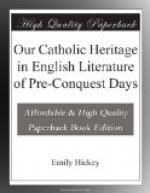In his studies Alfred was helped by various friends, the chief of whom was a Welsh Bishop, named Asser. So greatly did Alfred value Asser that he wanted him to live altogether at Court; but Asser felt, it is to be supposed, that this would not be right, and arranged to spend half his time in Wales and half with the King. From him we learn a great deal about Alfred.
One of the Latin books translated by Alfred—perhaps the first—was called the “Pastoral Care” ("Cura Pastoralis"). It was written by St Gregory the Great, and was intended for the clergy as a guide to their duties. The king had a copy sent to every bishopric. He called it the Herdsman’s Book, or Shepherd’s Book. Sending all these copies made of course a great deal of work for scribes or “bookers,” as we may render the old “boceras,” the copyists who had to write out all their books by hand.
As various books had been turned into the “own tongue” of various nations, so would Alfred give to his people in their “own tongue” books of help, of knowledge, of wisdom. This is how Alfred tells us he worked.
“I began to turn into English the book which in Latin is named ‘Pastoralis,’ and in English ‘Shepherd’s Book’; sometimes word for word, sometimes meaning for meaning, as I had learned it from Plegmund, my Archbishop, and Asser my Bishop, and from Grimbold, my Mass-priest, and from John, my Mass-priest.”
At the end of the translation, Alfred put some little verses of his own.
Alfred as we have seen, translated St Bede’s History, omitting many chapters which contained things he may be supposed to have thought were not of general interest. He also edited the English, usually called the Anglo-Saxon, Chronicle, which begins with the invasion of Julius Caesar, and ends with the accession of Henry II. There are a good many MSS. of it, the earliest of which ends with the year 855. We owe this work, as we owe so much beside, to the care of the monks who wrote it, adding to it probably, year by year, sometimes giving poetry as well as prose. It contains several poems, among them the vigorous lay of the Battle of Brunanburh, fought in 937 by Athelstane against the Scots and Danes. You will find a rendering of it among Tennyson’s poems, made by him from a prose translation of his son’s. This editing of the A.S. Chronicle was very important work, work that has helped generations of history-writers and students. Where should we be without these Histories? How much of it Alfred actually did himself we do not know: we may suppose he had a good deal to do with the chronicling of the events of his own reign. I wonder whether it was he that wrote how three bold Irishmen came over from Ireland in a boat without any rudder, having stolen away from their country, “because they desired for the love of God to be in a state of pilgrimage, they recked not where.” They had a boat made of “two hides and a half,” and provisions for a week. They got to Cornwall on the seventh




